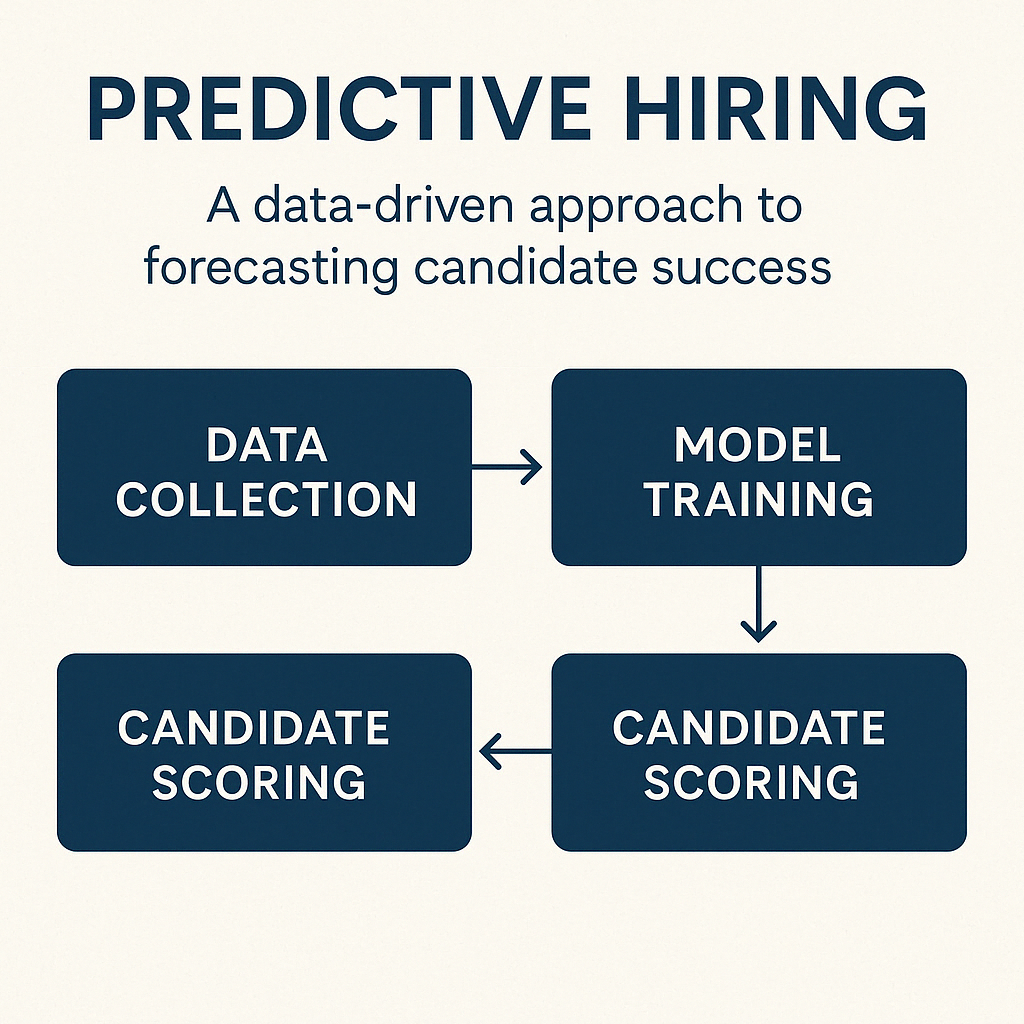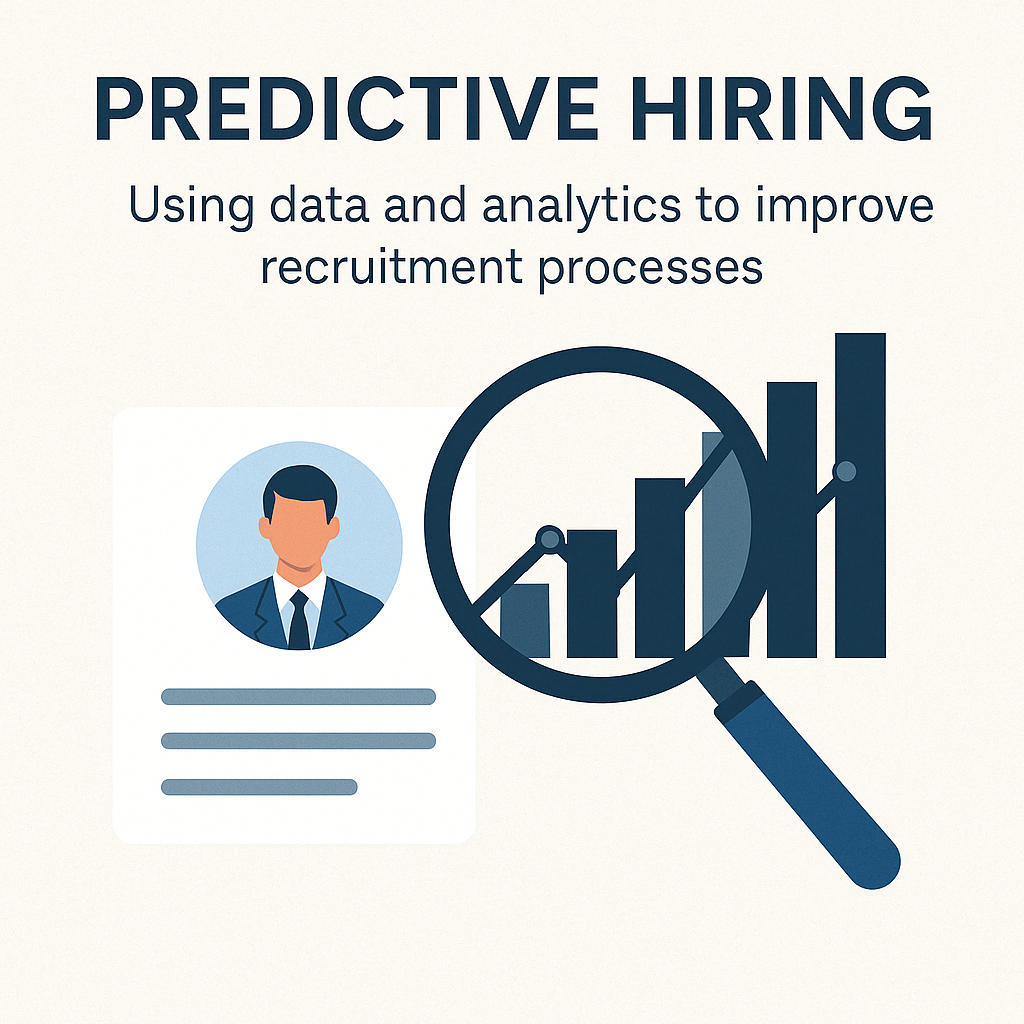Predictive Hiring: Transforming Recruitment with Data-Driven Forecasting
What is Predictive Hiring?
Predictive Hiring is a data-driven approach to recruitment that leverages historical data, machine learning, and statistical modeling to forecast the potential success of job candidates. Rather than relying solely on resumes and interviews, this method uses predictive analytics to evaluate which applicants are most likely to thrive in a given role based on patterns found in previous hiring outcomes.
Predictive Hiring is a core component of modern Talent Intelligence systems and is increasingly used by HR departments to enhance the precision and fairness of hiring decisions.

Why Predictive Hiring Matters
Traditional recruitment often relies on human intuition and subjective criteria, which can lead to bias and inconsistent results. Predictive Hiring offers a more scientific alternative that:
Improves hiring quality by identifying high-potential candidates earlier
Reduces turnover by matching candidates with long-term success traits
Accelerates time-to-hire by prioritizing top-fit profiles
Supports DEI (Diversity, Equity, Inclusion) with bias-reduced algorithms
How Predictive Hiring Works
Data Collection
Collects structured and unstructured data from resumes, assessments, interviews, ATS logs, and job performance records.
Model Training
Machine learning algorithms identify correlations between candidate attributes (e.g. education, skill sets, experience, personality traits) and hiring success metrics (e.g. performance reviews, promotion rates, retention).
Candidate Scoring
Each applicant is scored based on their predicted likelihood to succeed in the role or fit within the team/organization.
Recommendation Engine
Hiring managers receive ranked candidate shortlists with confidence scores and insights into predicted strengths and gaps.
Use Cases of Predictive Hiring
Industry | Application |
|---|---|
Retail & Call Centers | Identifying candidates likely to excel in customer service and stay longer |
Tech & Engineering | Matching specific technical skills with long-term development potential |
Healthcare | Screening for candidates with high empathy and stamina for demanding environments |
Sales | Predicting candidates with traits linked to quota achievement and client retention |
Benefits of Predictive Hiring
✅ Higher Retention Rates: Match candidates based on organizational culture and values
✅ Faster Hiring Decisions: Reduce manual resume reviews through intelligent ranking
✅ More Inclusive Hiring: Minimize unconscious bias by focusing on data
✅ Improved Candidate Experience: Automated, consistent evaluation reduces wait times
Predictive Hiring vs Traditional Hiring
Feature | Traditional Hiring | Predictive Hiring |
|---|---|---|
Candidate Evaluation | Based on resume & interviews | Based on historical success patterns |
Speed | Slower due to manual review | Faster with automated shortlisting |
Bias Risk | High (subjective decisions) | Lower (algorithm-based ranking) |
Success Prediction | Low accuracy | High accuracy through data models |

Challenges and How to Overcome Them
Data Privacy Concerns
✅ Use anonymized data and ensure compliance with GDPR, CCPA, and other relevant laws.Algorithmic Bias
✅ Regularly audit models for fairness; avoid training on biased historical hiring data.Resistance to Change
✅ Provide training and transparency to hiring managers; show ROI through pilot programs.
Real-world Examples
Unilever uses AI-driven predictive hiring for graduate recruitment, reducing time-to-hire by 75% and improving diversity.
IBM integrates predictive analytics into its talent strategy to match skills with project demands and improve job fit.
HireVue and Pymetrics offer platforms combining video interviews and behavioral assessments with predictive scoring.
Conclusion
Predictive Hiring is revolutionizing talent acquisition by shifting from intuition to intelligent forecasting. By combining data science and HR expertise, organizations can make faster, fairer, and more effective hiring decisions—ultimately building stronger, future-ready teams.
FAQ: Predictive Hiring
Q1: Does Predictive Hiring replace human recruiters?
No. It augments their capabilities by providing deeper insights and more accurate candidate recommendations. Final decisions still involve human judgment.
Q2: How accurate is predictive hiring?
Accuracy depends on the quality of historical data and model design. In many cases, it outperforms human-only decisions, especially in high-volume recruiting.
Q3: Can predictive hiring be used for all roles?
It is most effective for roles with clear performance metrics and repeatable success factors, such as sales, customer service, and operations.
Q4: Is predictive hiring legal and ethical?
Yes, if implemented with transparency, fairness, and data protection in mind. Ethical AI practices and compliance with privacy laws are essential.
From recruiting candidates to onboarding new team members, MokaHR gives your company everything you need to be great at hiring.
Subscribe for more information

